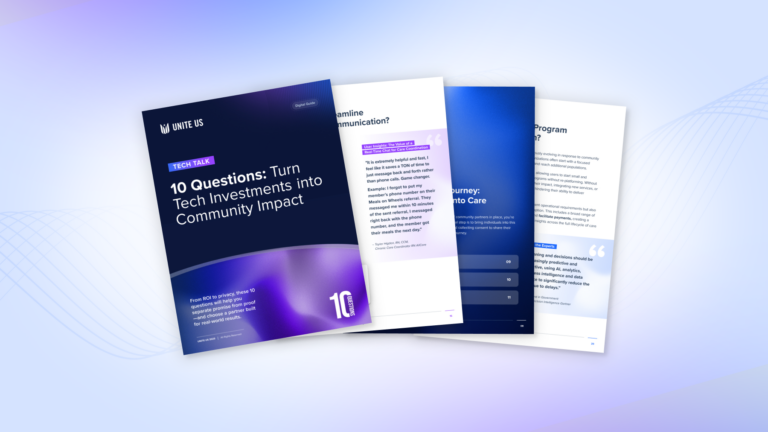
Whole-Person Care and the Impact of Social Determinants of Health
Social determinants of health (SDoH) are the conditions in which people are born, grow, live, work, and age—and these conditions shape health. Research shows strong connections between the social and economic needs of patients and their health challenges. A new white paper, written by Spencer Pratt, Vice President of Sales Solutions at Unite Us, discusses how health organizations can measurably improve health outcomes, and close care gaps through whole-person care and SDoH-driven interventions:
- Healthcare costs: Total cost of care per member, per year (PMPY)
- Adverse system utilization: Hospital and emergency department visits
- Compliance and adherence: Care plan compliance and medication adherence
- Consumer experience: CAHPS surveys and retention
- Health outcomes: Physical and mental health outcomes
- Other measures: Unhealthy days and COVID impact
Measuring the Impact of SDoH
With the emergence of value-based care and at-risk contracting, today’s health plans and providers are increasingly responsible for total care costs and health outcomes for their members and patients. As a result, more organizations are beginning to focus on nonclinical and upstream factors that drive costly healthcare utilization and diminished health status. To systematically measure the impact of SDoH challenges across a variety of demographics, geographies, and health outcomes definitions, we have developed an innovative analytics approach that defines and measures social and economic vulnerability.
Game-Changing Opportunity to Make a Difference
To improve health trajectories in the U.S., the healthcare industry must flip the traditional care model from reactive to proactive. This involves identifying and stratifying advanced clinical and social needs. Health plans and providers can move the needle significantly by embedding appropriate SDoH programs in their workflow and engaging with responsive community partners. As a pioneer for data-driven SDoH innovation, our end-to-end solution enables organizations to effectively assess social care needs, identify optimal engagement strategies, and enroll individuals in needed services. An excerpt from the white paper:
“The success of these interventions will unlock new funding streams, galvanize the next generation of health policy, and reinforce incentives for collaboration and data sharing. Most importantly, they will engage traditionally underserved patient populations and communities, ensure they feel heard the first time they tell their story, and lead to meaningful improvements in health and quality of life.”
– Spencer Pratt, Vice President of Sales Solutions at Unite Us
Learn how your organization can improve health outcomes using SDoH:



